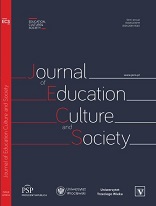Cooperative learning issues in elementary education: a Lithuanian case study
Cooperative learning issues in elementary education: a Lithuanian case study
Author(s): Daiva Jakavonytė-Staškuvienė, Aušra Žemgulienė, Emilija SakadolskisSubject(s): Education, Sociology of Education
Published by: Fundacja Pro Scientia Publica
Keywords: Cooperative learning;Group processing;Social interdependence theory;
Summary/Abstract: Aim. Cooperative learning (CL) is a widely recognised pedagogical practice which involves students working together to achieve common goals that they could not complete individually. Johnson and Johnson are among the main theorists behind the movement. In 1994 they announced five elements essential for the successful incorporation of CL in the classroom: (a) positive interdependence; (b) face-to-face promotive interaction; (c) individual and group accountability; (d) interpersonal and small group social skills; (e) group processing. In this study we seek to understand how primary school teachers implement cooperative learning and include the above-mentioned aspects in their classes. Methods. The qualitative case study was conducted at a primary school in Vilnius, Lithuania. Two lessons were recorded, transcribed, and analysed to gather evidence concerning variables that mediate cooperative learning. The teachers planned the lessons together, using the principles that are outlined in a professional development method called Japanese lesson study. The study involved two teachers and 40 (20+20 pupils in two classes) fourth graders. Also, interviews were conducted with the teachers and three pupils from each class. Results and conclusion. The forms of cooperative learning observed in the classrooms were markedly different, even though the lesson plans were almost identical. In Lesson 1 the teacher paid more attention to interdependence, interaction, and reflection. Consequently, students mentioned cooperation, assistance, and specifics of group workmore frequently. In Lesson 2, there was more traditional group work than CL schemes, and less interdependence, interaction, and reflection. The five essential elements were unequally represented in the lessons, highlighting the varied understanding of CL. ‘In situ’ research revealed which elements of cooperative learning need to be stressed inteacher pre-service and in-service settings. The study also deepened the understanding of which aspects are more difficult to implement, or which have made significant inroads into classroom practice. Originality. Situational research involving both CL and Japanese Lesson Study techniques provide valuable insights into the professional development of teachers who aim to improve their classroom practice.
Journal: The Journal of Education, Culture, and Society
- Issue Year: 12/2021
- Issue No: 1
- Page Range: 445-468
- Page Count: 24
- Language: English

